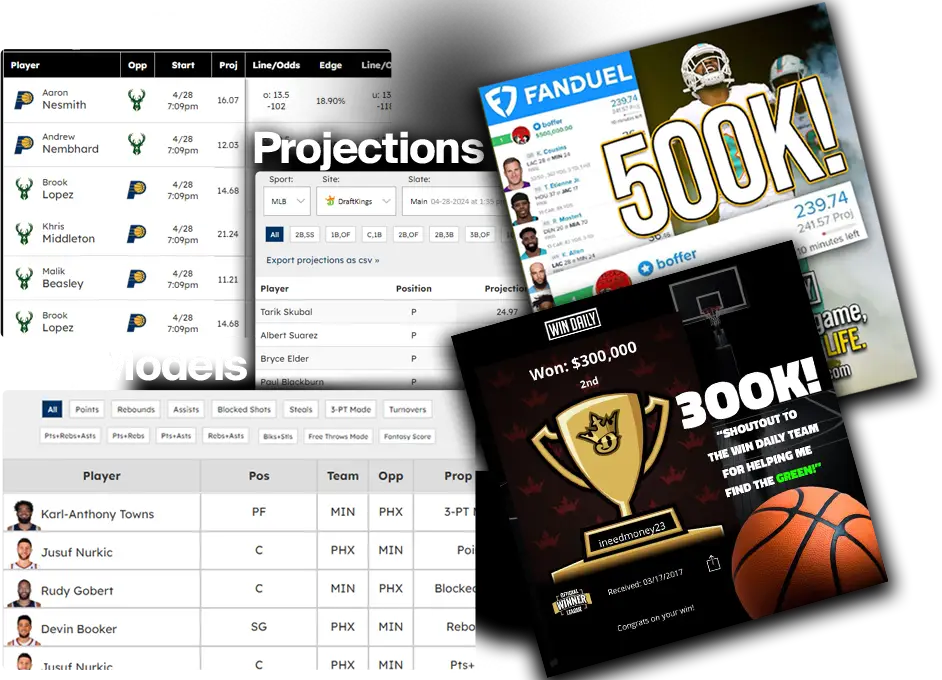GAMEPLAY
DFS games all operate in the same general way. You, the player, create a fantasy sports team composed of real players who are playing in real games on the day of the DFS competition. As the real-life games are played that evening, your team scores fantasy points based on the achievements of your chosen players. For example, in baseball, if one of your players hits a single, he gets three points; a double is worth five; and a home run is worth ten. In football, a passing touchdown is worth four points, while rushing and receiving touchdowns are each worth six. In basketball, one point on the scoreboard corresponds to one fantasy point, and if a player grabs a rebound, you get 1.25 points. There are many actions that can take place in a game, and each has a positive or negative point value. Those point values vary from site to site, which is why you should focus on one until you’ve mastered it.
DFS sites offer several different types of games. As a newcomer, you should start small and explore each type, ultimately deciding which one is best for you. You need to ask yourself what your broader goal is. Are you playing to have fun and maybe win a little money? Are you going to play small games day after day, hoping to turn a profit at the end of the week or the month? Or are you chasing the prizes awarded in large tournaments? No matter how you answer these questions, there is a DFS game for you.
Head-to-head games are the most basic form of DFS competition and the easiest ones to play. The name says it all: you build a lineup and compete against one other opponent in a winner-take-all contest where the team with the highest fantasy points takes the prize. Every fantasy site offers these competitions, and playing low-stakes, head-to-head games is a great way for a beginner to get a feel for DFS. Simply log onto the fantasy website that you are playing on and filter the draft lobby (the board that shows all the current contests) to find head-to-head leagues.
There’s a middle ground between head-to-head play and the massive, high-risk, high-reward tournaments. It’s what’s known as 50/50 competition. In 50/50 games, the top half of the field wins the same amount of money. If one hundred people are playing, fifty of them will win, whether they finish first or fiftieth. The prizes are relatively small, but there’s a much better chance that you’ll claim one if you only have to finish in the top 50 percent.
Other types of contests include double-ups, triple-ups, and multipliers. Double-ups are games in which winners receive double their entry fee as a prize. In triple-ups, players can win three times their entry fee. Multipliers are games in which the prize is a multiple—five or possibly ten times what you paid to enter. Games of this type are often low stakes. For example, you might pay $5 to enter a double-up contest in which the top one thousand players (out of twenty-five hundred entrants) win $10 each. For this reason, it’s better to enter double-up contests with a large number of players. If you’re only playing against nine other people, it’s going to be harder to end up in the top half of the field than it will be if you’re playing against 499 other people.
The form of DFS play that is probably best known is the large field, multi-entry GPP tournament. GPP stands for Guaranteed Prize Pool. These contests can feature extraordinary prizes, up to $1,000,000 at times. The huge prizes draw thousands of entries. As I write this, DraftKings has an NFL tournament posted with a $5,000,000 prize pool and a $20 entry fee. The first-place winner gets $1,000,000; the player in second gets $200,000, and the prizes go down from there. The top 25 percent of players will win something, but the lowest prize is $30, only a $10 profit. Some tournaments allow players to create multiple lineups, while others are single-entry, meaning that you only get one lineup and one shot. If you can enter five or ten different lineups into the same tournament, it will likely improve your odds of winning something, but it will also increase your risk. The prize pools for multiple-entry tournaments tend to be larger than those for single-entry events. Single-entry tournaments allow players to create a lineup the same way they might for a head-to-head or 50/50 game, while competing for a larger prize, even if it’s not as big as one you could win in a multiple-entry tournament.
Satellite tournaments are also an option, but not one I recommend for beginners—in my opinion, they’re best suited for intermediate or experienced players. In a satellite tournament, the winner gets a voucher that allows them to compete in a bigger event with a higher buy-in. For example, a satellite with a $10 buy-in that’s open to ten players would earn the winner a ticket to a larger event worth $100. Some so-called “super-satellite” tournaments award tickets to multiple players.





